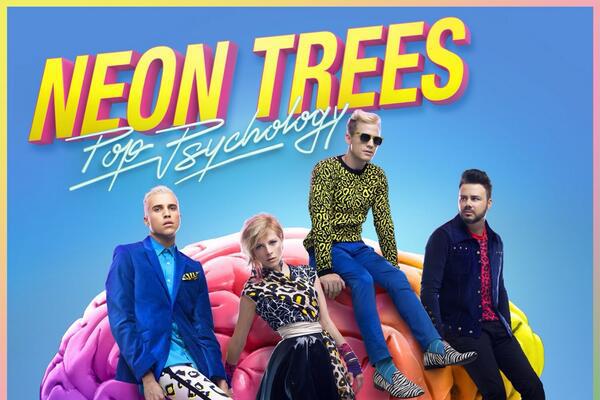Neon Trees latest album addresses darker and diverse topics
Despite the similarities to their past albums, Neon Trees takes a lyrical spin on their songs and addresses darker and overall more diverse topics.

Pop Psychology combines heavy synths, dance beats, and harmonious vocals for a sound distinctly Neon Trees.
Following their substantially successful sophomore album, “Picture Show,” Neon Trees comes back stronger and catchier than ever with their third studio album release, “Pop Psychology.” The electric quartet from Provo, Utah has fully hit their stride through this album’s intoxicating hooks and surprisingly varying tracks.
“Pop Psychology” brings back the band’s classic sound of heavy synths, dance beats, and harmonious vocals from Tyler Glenn and Elaine Bradley that wrap up into a mood that can only be described as neon. Despite the similarities to their past albums, Neon Trees takes a lyrical spin on their songs and addresses darker and overall more diverse topics.
Even though there are no noticeable hiccups on this record, there are a few distinct tracks that emphasize the attitude and rhythm of the album such as opening track, “Love in the 21st Century,” Teenager in Love,” and previously released singles, “Voices in the Halls,” “Sleeping With a Friend,” and “I Love You (But I Hate Your Friends).” “Voices in the Halls” addresses a softer and gloomier theme about a past and no longer existing love, showing Glenn’s ability to step away from a romanticized look on life and focus on the the drearier stories of his music.
“Sleeping With a Friend” finds the quintessential groove of the band’s sound that drove the band to the top of the charts in 2008. The track proves that although Neon Trees can take a departure from their typical style, they can still hit hard with an idealistic pop song. As Glenn sings in the song, “Why mess up a good thing?”
While appearing similar in their song titles, songs like “Love in the 21st Century,” “Teenager in Love,” and “I Love You (But I Hate Your Friends)” each have their own unique style, addressing various troubles in relationships like technology, teenage angst and confusion, and, like the title suggests, hating the friends of your significant other.
Overall, “Pop Psychology” is a surefire success, and while sticking to their roots, Neon Trees also shows great diversification amongst their tracks. The hits from “Pop Psychology” can assuredly be pinned up along with their previous hits, as this album is anything but a flop. The band is playing at First Avenue on June 23 for all ages.
















































